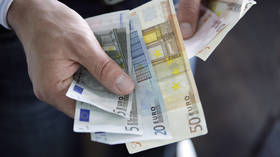Morgan Stanley predicts euro slump

The euro currency is expected to slide toward parity with the US dollar within months, investment bank Morgan Stanley has projected, citing growing political risk and economic weakness.
The European single currency will decline to 1.02 against the greenback by year-end, marking a depreciation of around 7% from current levels, David Adams, head of Group-of-10 foreign-exchange strategy at Morgan Stanley, said in an interview reported by Bloomberg.
According to the strategist, the outlook comes amid anticipation that the European Central Bank (ECB) will press ahead with interest-rate curbs at its next three meetings with the possibility of a substantial half-point rate cut.
“There is plenty of scope for the market to refocus on the fact that the ECB could be cutting deeper and faster than what is currently priced,” Adams said. “This week’s meeting could prove an important catalyst for the market to start thinking about that.”
The forecast is reportedly the most pessimistic among currency analysts polled by the news agency, with the consensus anticipating that the single currency will actually rise to $1.11 by the end of 2024. It comes as traders’ attention turns to the ECB’s rates decision later this week.
The regulator is expected to settle on a quarter-point rate cut, which would be the second lowering during the current cycle as the region’s economy is struggling to maintain growth momentum.
“Political risk premia and uncertainty are rising at a time when economic growth is slowing,” the strategist said. “Both of those factors suggest investors would be less willing to deploy capital in the region.”












